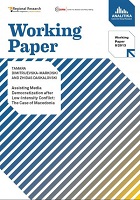Assisting Media Democratization after Low-Intensity Conflict: The Case of Macedonia
Assisting Media Democratization after Low-Intensity Conflict: The Case of Macedonia
Author(s): Tamara Dimitrijevska-Markoski, Zhidas Daskalovski
Contributor(s): Kristina Irion (Editor), Tarik Jusić (Editor), Mirela Rožajac-Zulčić (Editor)
Subject(s): Politics, Media studies, Communication studies, Government/Political systems, Demography and human biology
Published by: Analitika – Centar za društvena istraživanja
Keywords: North Macedonia; media; media assistance; democratization;
Summary/Abstract: The Republic of Macedonia is a landlocked country in Southeast Europe. According to the 2002 census the country has just above 2 million inhabitants, the majority being ethnic Macedonians (64%) and ethnic Albanians (25%), and the rest (11%) belonging to other ethnic groups such as Roma, Turks, Serbs, Vlachs, Bosniaks etc. Politically, it is a parliamentary democracy with an executive government, a unicameral legislator and a largely ceremonial president. Macedonia is a member of the United Nations, the Council of Europe and a candidate country of the European Union. In international relations the country is referred to as the former Yugoslav Republic of Macedonia (FYR of Macedonia) because of an unresolved dispute over the name with Greece, which has a region called Greek Macedonia bordering on the south of the country, and negates the right of Macedonia to name itself as such. In view of recent history, Macedonia is a successor state of the multi-ethnic Yugoslav Federation from which it declared its independence in 1991. Macedonia was not affected by the armed conflicts in the early 1990s when Yugoslavia fell apart but experienced unrest as a fallout from the Kosovo crisis after Albanian refugees from Kosovo fled to Macedonia. In the early 2000s, a short-lived armed conflict ensued between Macedonian forces and Albanians who sought autonomy for the mainly Albanian-populated area of Macedonia. The Ohrid Framework Agreement facilitated by the United States and the European Union reestablished peace and laid the foundations for a better representation of minorities and their rights in Macedonian politics.
Series: Analitika - Working Paper
- Page Count: 57
- Publication Year: 2013
- Language: English
- Introduction
- Content File-PDF

